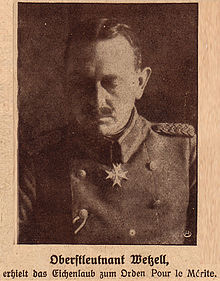
Karl Eduard Wilhelm Groener was a German general and politician. His organisational and logistical abilities resulted in a successful military career before and during World War I.

Ludwig Alexander Friedrich August Philipp Freiherr von Falkenhausen was a German officer most notable for his activities during World War I.
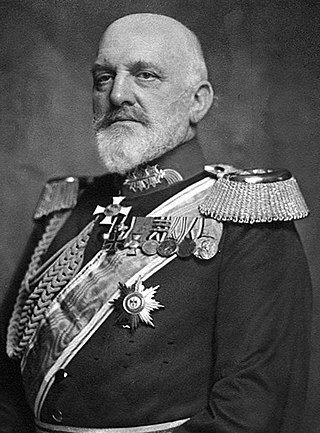
Josias von Heeringen was a German general of the imperial era who served as Prussian Minister of War and saw service in the First World War.
Eduard Julius Ludwig von Lewinski was a Prussian general. His younger brother Alfred von Lewinski also became a Prussian general.
Hans Rittervon Hemmer,,son of Colonel Anthony Hemmer,was an officer in the Royal Bavarian Army and Knight Commander of the Military Order of Max Joseph.
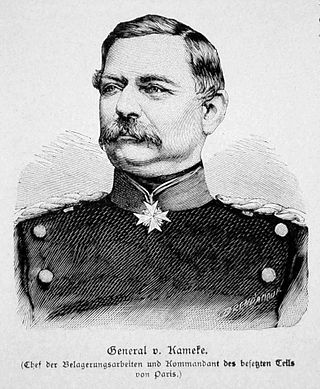
Arnold Karl Georg von Kameke was a Prussian General of the Infantry and Minister of War.

Hugo Ewald Graf von Kirchbach was a Prussian general who commanded the Prussian V Corps during the Franco-Prussian War.

Hermann Josef von Kuhl was a Prussian military officer,member of the German General Staff,and a Generalleutnant during World War I. One of the most competent commanders in the German Army,he retired in 1919 to write a number of critically acclaimed essays on the war. Hermann von Kuhl is one of only three recipients to be distinguished with both the "military class" and "peace class" of the Pour le Mérite,Prussia's and Germany's highest honor.
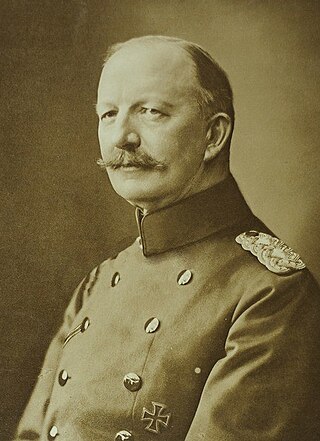
Herrmann Gustav Karl Max von Fabeck was a Prussian military officer and a German General der Infantarie during World War I. He commanded the 13th Corps in the 5th Army and took part in the Race to the Sea on the Western Front and also commanded the new 11th Army on the Eastern Front. Subsequently,he commanded several German armies during the war until his evacuation from the front due to illness in 1916 and died on 16 December. A competent and highly decorated commander,von Fabeck is a recipient of the Pour le Mérite,Prussia's and Germany's highest military honor.

Karl Freiherr von Plettenberg was a Prussian officer,and later General of Infantry during World War I. He was Commandant-General of the Guards Corps,Adjutant General of the German Kaiser Wilhelm II and a recipient of Pour le Mérite.

Hermann Christian Wilhelm von Strantz was a Prussian officer,and later General of Infantry during World War I. He was a recipient of Pour le Mérite.
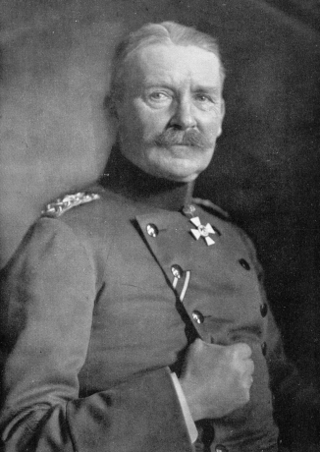
Alexander Ferdinand Ludolf von Quast was a Prussian military officer,participant in the Franco-Prussian War and a general in the First World War. He commanded the German 6th Army during the Battle of the Lys of the Spring Offensive in 1918.

Karl Christof Friedrich von Gerok was an officer of Württemberg,general of the infantry of the XXIV Reserve Corps during World War I.

Robert Paul Theodor von Kosch was a Prussian General of the Infantry during World War I.

Theodor Wilhelm Gustav Erich Gündell,from 1901 named von Gündell,was a Prussian officer,most noted as a general of infantry in World War I.

Albrecht von Thaer was a German General Staff Officer and representative ("Generalbevollmächtigter") of Frederick Augustus III of Saxony the last. He came to prominence in connection with his participation in the controversial long-distance cavalry exercise between Berlin and Vienna in 1892 and,later,on account of his First World War diaries,when these were published posthumously.
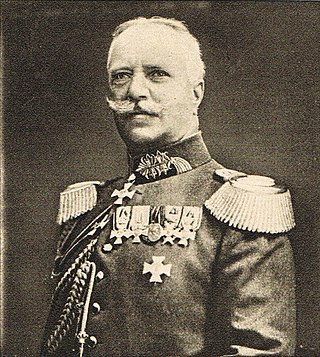
Richard Heinrich Karl von Conta was a German General der Infanterie during World War I. He was notable for his participation in the Battle of Belleau Wood.

Arnold Lequis was a German General of the Infantry who commanded the 12th Division during World War I as well as a commander of the Reichswehr during the German Revolution of 1918–19 against the Communists.

Wilhelm Ludwig Erich Felix von Tschischwitz was a German General of the Infantry who participated in World War I. He was part of the Imperial German General Staff during the German spring offensive as well as commanding the Reichswehr after the war concluded.

Alfred Hans Emil Friedrich von Böckmann (1859-1921) was a German general in World War I. He commanded several corps throughout the war and commanded the Guard Corps during the Fifth Battle of Ypres.
